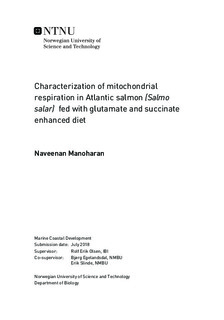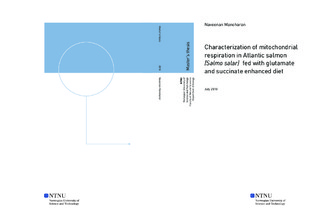| dc.description.abstract | The smolt stage of salmon has challenges in reaching adequate growth rates due to the changing environmental conditions at sea. Therefore, it is necessary to provide adequate diets to achieve sufficient growth. The present experiment is focused on studying the impact of growth in smolts of Atlantic salmon fed with glutamate and succinate (1% each) supplemented diet during a one-month period. The study focuses on characterization of mitochondrial respiration capacity using high-resolution respirometry technique in salmon provided with supplementary diets. Total protein content and citrate synthase enzyme activity were also quantified in heart and liver tissues.
Results indicate that there was no statistically significant difference in growth response between the fish groups fed and not fed glutamate and succinate. Mitochondrial respiratory states showed that the addition of succinate lead to maximum OXPHOS. A significant difference was observed in LEAK respiration state in heart tissues. No significant difference was observed in the respiration states of liver tissues. Comparison of heart and liver tissue responses for substrates and inhibitors revealed significant differences. Flux control ratio between ETS and OXPHOS showed significant difference in liver homogenates. Oxygen consumption rate ratios normalized to OXPHOS showed several significant differences, therefore, revealing that responses were organ and diet dependent.
Nominally higher citrate synthase activity was observed in heart and liver tissues, although not statistically significant. Results from the present study establish the importance of both dietary succinate and glutamate supplementation in improving growth rates in smolt stages of farmed Atlantic salmon as well as producing positive changes in mitochondrial activity. Further studies on salmon mitochondrial activity in other organs has been suggested.
Keywords: mitochondrial respiration, Salmo salar, glutamate, succinate, fish diet, oxidative phosphorylation, oxygraph | |

